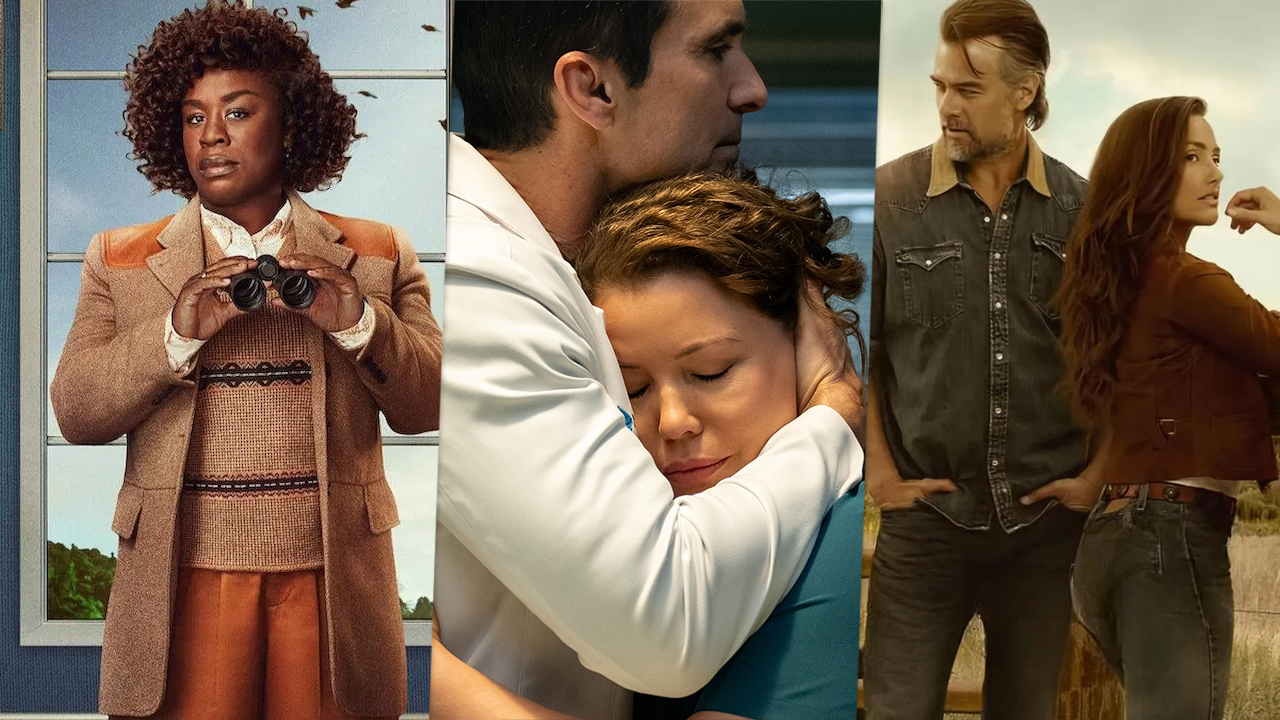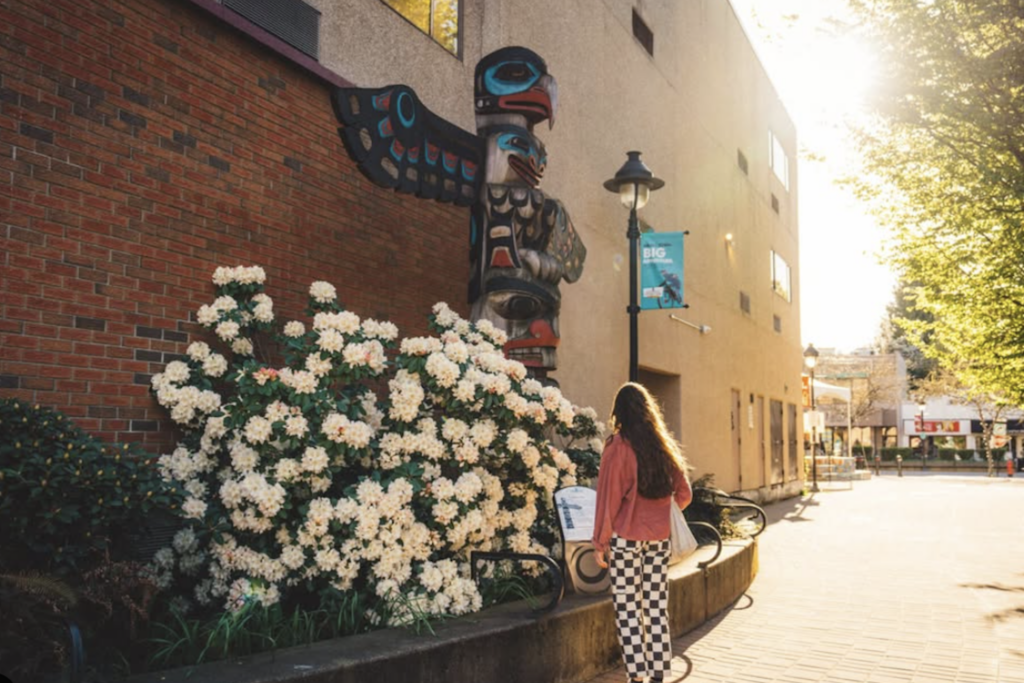By Liz Nicholls, .ca
There’s a very unusual storyteller’s cabaret happening in a handsome brick- and wood-lined room in the river valley. Norse mythology: where friends meet. And if the gods are overseeing the whole operation from their own spot in the time-space continuum, I’m pretty sure they’d be smiling at the effrontery, and the chutzpah, of it all.
To help support .ca YEG theatre coverage, click here.
And in the course of it, KaldrSaga, as billed “a new queer, old Norse cabaret,” shape-shifts itself into a play about high-stakes friendship, in this ingenious latest from playwright Harley Howard-Morison and Cardiac Theatre.
In the former Ortona Armoury, reno-ed into a new life as ArtsHub Ortona, two queer ex-friends, a storytelling double-act, are having an awkward, fractious reunion. One of them is the instigator and cajoler; the other, resentful, is the cajöle-ee (it’s an ancient Norse word I just made up).
When we met them in 2019, Kaldr and Saga were friends, getting together in a pub after a year apart, to tell queer origin stories inspired by Norse mythology. Which is, as we learned, a veritable repository of gender-fluid exuberance. This new cabaret, by Harley Howard-Morison and inventively directed by Sarah J Culkin, has Kaldr (Graham Mothersill) and Saga (Michelle Diaz) singles out queer friendship origin stories — and in the telling, their own emerges.
This is a relationship on the rocks judging by the long (I found it a bit over-long) first “Movement” of four, entitled “Shit-Slinging All Around.” And the question of whether friendship, in particular queer friendship, once lost can be reclaimed, is in the balance.
It will give you some idea of the sense of humour at play to know that as the show opens, Saga (that’s Dr. Saga Steinundötor to you), whose PhD is in nihilism, is delivering a TED talk on meaning. And more specifically on how there isn’t any. Kaldr, who’s crashed the talk rather spectacularly, has been making a name dipping into their shared repertoire of stories to get commercial traction online; Saga calls it selling out.
The actors in Culkin’s production are a study in contrast: Diaz is petite and peppery and Mothersill is strapping and forceful. The performances are go-for-the-gusto in a multi-layered assignment to play storytellers who act in their own stories. And both seem jazzed by connecting with the audience directly — competing for our favour, improvising, annotating. They constantly step outside the frameworks they establish — the multiple gods, animals, people that their main characters Kaldr and Saga play — in order to deliver amusingly barbed asides or critiques of the narrative, the gods, their performances, the odd theatre joke about “main character energy” — and then they step back in. They’re their own stage managers, in a playful way. This will sound impossibly complicated. But the crazy scramble of is part of the fun (this is not a show that turns its nose up at goofiness).
The designer is Whittyn Jason, and they provide knapsacks full of props. A lot of braids and fake moustaches, weaponry, hats fly through the show, with more to come in the grand finale. And Kena León’s sound design is a zinger, with its own punch lines. The pace of Culkin’s production is dizzying. And Howard-Morison’s writing is bright and witty; contemporary asides and Norse idioms jostle together in his script.
The first story Kaldr and Saga re-create, from their best-of vault, is a funny reimagining of that traditional bastion of machismo, the Western. This cowboy vaudeville has queer characters (they ride into the sunrise not the sunset, “two boys, and a horse under each”), a queer attraction-at-first-sight scene with an alluring stranger, frankly fake accents, sight gags, and a generous assortment of double-entendres. Lindsey Walker provides a traditional song to match. oundtrack to match.
The central feature is the challenge of a female gunslinger who visits a graveyard, dressed in manly Western gear, to summon the spirit of her deceased father from Valhalla and reclaim his sword. The question apparently is whether dad will stay dead or not.
“Dragnarök,” a flamboyant drag revue, has roots in the story of tough-guy Norse god Thor, always accompanied by thunder, who wears a dress to a wedding in order to get his signature hammer back. Howard-Morison imagines a confrontation between Thor, played by Saga, and Thor’s teenage son Mosey, hilariously played by Kaldr, sulking because his dad won’t let him quit martial arts and take musical theatre studies — Hammerstein to Hamilton — instead. How this leads to a go-for-the-gusto double drag number is something I’ll leave with you. Funny, and unexpectedly heart-catching, too.
The final story is about an unusual friendship in a war-centric world, between Tyr, a wayward son of Odin, and Fenrir, a wolf who hasn’t lived up to his billing in monstrousness. And there’s a sacrificial price to be paid for Tyr’s loyalty. There’s a nutty sort of magic to the way it’s told by Kaldr and Saga, using homely objects that will make you smile and test your rapport with the story as it unfolds. A ball of yarn turns in a particularly poignant performance as Fenrir.
It’s fun and spirited. And in the end, as KaldrSaga returns to the academic question of meaning, it turns out there’s a kind of redemption about the act of telling a story in itself. That’s what friends are for. Welcome back, Cardiac.
talks to playwright Howard-Morison and director Culkin in this preview.
REVIEW
KaldrSaga: a new queer, old Norse cabaret
Theatre: Cardiac
Written by: Harley Howard-Morison
Directed by: Sarah J Culkin
Where: ArtsHub Ortona, 9722 102 St.
Running: Friday through June 8, Fridays through Sundays
Tickets: cardiactheatre.ca
















